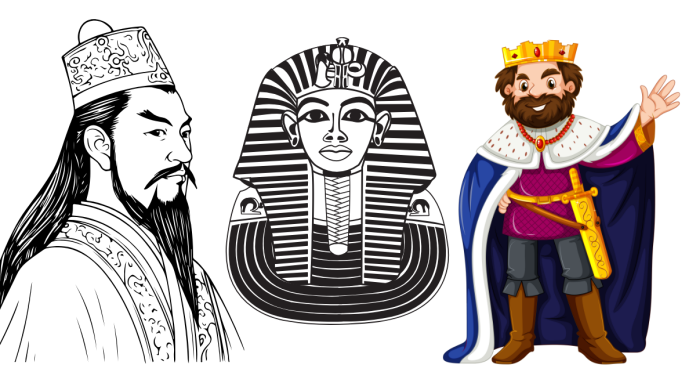Throughout history, many kings have left an indelible mark on their nations and the world through their leadership, vision, and accomplishments. Here’s a list of the top 10 greatest kings who are celebrated for their influence and legacy:
1. Alexander the Great (356–323 BCE)
- Empire: Macedonian Empire
- Achievements:
- Conquered most of the known world by the age of 30.
- Spread Greek culture and influence throughout Asia, the Middle East, and Egypt.
- Founded over 20 cities, including Alexandria in Egypt.
2. Genghis Khan (1162–1227)
- Empire: Mongol Empire
- Achievements:
- United Mongol tribes and created the largest contiguous empire in history.
- Established trade routes like the Silk Road, facilitating cultural exchange.
- Revolutionized warfare with his innovative strategies.
3. Ashoka the Great (304–232 BCE)
- Empire: Maurya Empire (India)
- Achievements:
- Unified most of the Indian subcontinent.
- Renounced violence after the Kalinga War and promoted Buddhism.
- Known for his policies of tolerance, welfare, and nonviolence.
4. Napoleon Bonaparte (1769–1821)
- Empire: French Empire
- Achievements:
- Rose to power during the French Revolution.
- Modernized France with the Napoleonic Code, influencing legal systems worldwide.
- Built an empire spanning Europe but was eventually defeated at Waterloo.
5. Charlemagne (742–814)
- Empire: Holy Roman Empire
- Achievements:
- Known as the “Father of Europe” for uniting much of Western Europe.
- Promoted education, culture, and Christianity.
- His reign marked the Carolingian Renaissance.
6. Akbar the Great (1542–1605)
- Empire: Mughal Empire (India)
- Achievements:
- Expanded the Mughal Empire across most of India.
- Implemented policies of religious tolerance and abolished discriminatory taxes.
- Fostered arts, culture, and architecture.
7. Julius Caesar (100–44 BCE)
- Empire: Roman Republic
- Achievements:
- Expanded Roman territories through military campaigns like the conquest of Gaul.
- Centralized the Roman government and introduced reforms.
- His assassination marked the end of the Roman Republic and led to the rise of the Roman Empire.
8. King Solomon (990–931 BCE)
- Empire: United Kingdom of Israel
- Achievements:
- Known for his wisdom and fair judgment.
- Built the First Temple in Jerusalem.
- Strengthened Israel’s economy and alliances.
9. Ramses II (1303–1213 BCE)
- Empire: Ancient Egypt
- Achievements:
- Known as Ramses the Great, ruled for 66 years.
- Expanded Egypt’s territory and secured peace with the Hittites through the first recorded treaty.
- Built monumental structures like the Abu Simbel temples.
10. Cyrus the Great (600–530 BCE)
- Empire: Achaemenid Empire (Persia)
- Achievements:
- Founded the Persian Empire and expanded it significantly.
- Known for his policy of tolerance toward conquered peoples.
- Issued the Cyrus Cylinder, considered the first declaration of human rights.
Conclusion
These kings are remembered not just for their conquests but also for their contributions to culture, governance, and humanity. Their legacies continue to inspire leaders and historians worldwide.




King James
King Davind
King Nebudcadnezer